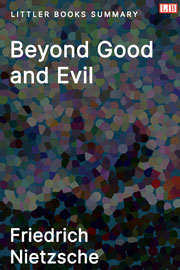Book Description
A critique of traditional moral and philosophical frameworks, arguing for a reexamination of values that moves beyond simplistic notions of good and evil.
If You Just Remember One Thing
Coming soon.
Bullet Point Summary and Quotes
- Nietzsche begins by questioning the assumed value of truth, challenging the traditional binary opposition between truth and untruth that has underpinned most philosophy.
- Conventional philosophers have typically relied on binary oppositions like good/bad and good/evil to assess value, while advocating for their own prejudices as universal truths. Nietzsche advocates crushing one's moral prejudices to actually descend to philosophical depths and truths.
- Every philosophy can be seen as "a kind of involuntary and unconscious memoir" reflecting the moral preferences of its philosopher.
- Nietzsche suggests that human thinking is not strictly rational, but is influenced by unconscious physiological drives and a "will to power" (the main drive of life).
- “A living thing seeks above all to discharge its strength -- life itself is will to power; self-preservation is only one of the indirect and most frequent results.”
- Nietzsche argues that concepts like religion and the existence of the soul are unprovable dogmatic "fictions" rather than absolute truths.
- Nietzsche is skeptical of philosophy's capacity for true discovery, noting how philosophies across cultures rediscover older ideas, potentially shaped by the similar grammars of their languages.
- Nietzsche posits the emergence of "free spirit" philosophers -- those who are independent, reject dogmatic moralities in favor of synthesizing new ethics, and experiment with different philosophies. For Nietzsche, such free-thinking individuals are important to revitalizing European culture beyond its perceived moral and philosophical decadence.
- “The strength of a person's spirit would then be measured by how much 'truth' he could tolerate, or more precisely, to what extent he needs to have it diluted, disguised, sweetened, muted, falsified.”
- Nietzsche argued assumptions are inevitable in philosophy, as even the statement "I think" contains unjustified premises like the existence of an "I" and a clear understanding of thinking itself. He believed the entire Western philosophical tradition was pervaded by unacknowledged prejudices from Christian theology.
- Nietzsche argued that the concept of a unified, enduring "self" or "soul" was an illusion adopted from Christian theology. Instead, he saw human beings as containing a multitude of competing drives and desires unified only by the basic will to power -- an innate drive for self-assertion, dominance, and the spreading of one's influence derived from our animal nature.
- While philosophers imagined humanity as moral, selfless, and holier than animals, Nietzsche claimed our motivations were often basic, darker, stemming from this underlying will to power that we tend to rationalize away.
- “He who fights with monsters might take care lest he thereby become a monster. And if you gaze for long into an abyss, the abyss gazes also into you.”
- Nietzsche criticizes the conformity and lack of independent thinking among scholars, arguing that they often simply repeat the views of their predecessors rather than engaging in original and critical thought. He suggests that true philosophers must go beyond the boundaries of scholarly conventions and develop their own unique perspectives.
- Nietzsche questions conventional notions of what is considered good or virtuous, critiquing philosophies that measure value based on pleasure and pain. He argues that attempting to "abolish suffering" is misguided, as suffering is essential for enhancing human virtues, strengthening the soul, and allowing individuals to create and perfect themselves. Rather than seeking mere comfort, Nietzsche contends that the philosopher should nobly pursue knowledge, even if accompanied by suffering, which acts as a crucible for human development.
- Nietzsche rejected Plato's notion of an eternal, unchanging "Truth" that exists independently of human observers and perspectives. He argued there are no such transcendent truths, only individual human experiences and the diverse perspectives and languages we use to make sense of that experience.
- To Nietzsche, all philosophies necessarily reflect the particular perspective of their creators rather than any objective reality beyond the plurality of subjective viewpoints.
- Nietzsche challenged the value of Christian morality's virtues like selflessness, kindness, and empathy, which previous philosophers had taken for granted as good. He argued this "herd morality" diminishes the individual by requiring the suppression of one's desires and will to power for the sake of serving others and society. While morality tamed humanity's outward aggression, Nietzsche believed it turned that energy inward through guilt and self-denial, hurting rather than elevating the individual.
- Nietzsche argued that modern European morality originated from a "slave morality" that arose among oppressed classes out of resentment toward their oppressors. This slave morality vilified the "master morality" values like freedom, power and sensuality celebrated by ruling classes, instead promoting virtues like kindness and pity that made suffering more bearable. Over time, Nietzsche believed the life-denying slave morality of Christianity infiltrated and overtook the life-affirming master moralities of earlier societies.
- While Christianity helped spread the notion of equality, Nietzsche argued that people in the real world are inherently unequal in their abilities, strengths and intelligence. He believed the universal values of Christian morality hindered society's progress by enforcing homogeneity and constraining the development of exceptional, independent minds who push culture forward.
Beyond Good and Evil: Resources
- Download this summary and 170+ other top nonfiction book summaries in one book (PDF, eBook, DOCX)
- Buy the book
